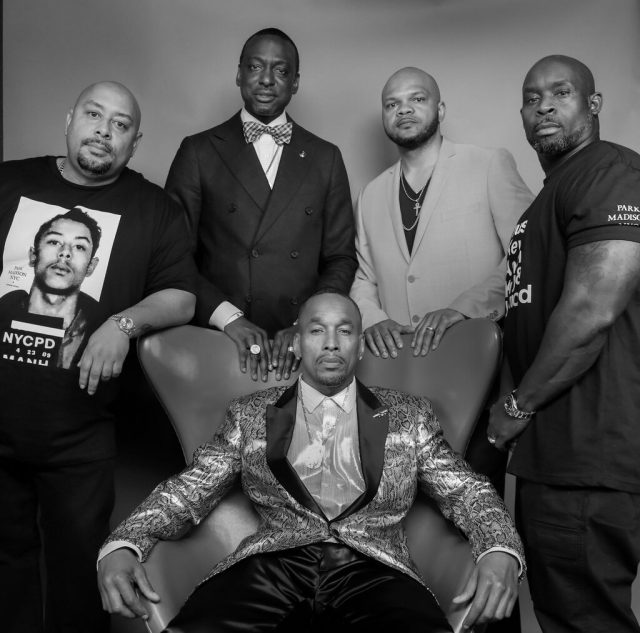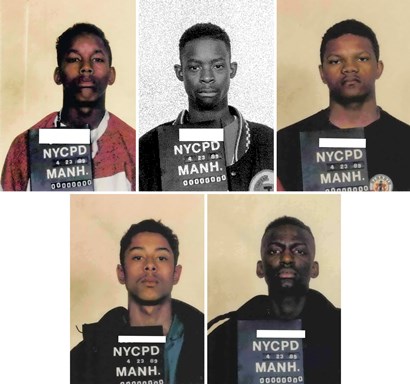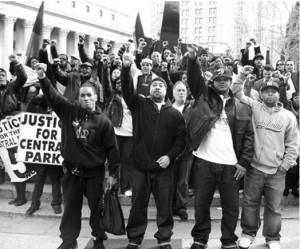
From left: Raymond Santana, Yusef Salaam, Korey Wise, Kevin Richardson, and Antron McCray in 2019.Credit…Bennett Raglin/Getty Images for BET
Opinion: By Yusef Salaam, Kevin Richardson and Raymond Santana
January 4, 2021
On Dec. 19, 2002, a judge vacated our convictions for the brutal attack of Trisha Meili, who many know as the “Central Park jogger.” On that day, our 13-year fight for justice came to an end. The lies that we were told by detectives to wrongly convict us were finally exposed and ceased to hold power over us. Now, we are fighting to prevent others from facing the same fate.
At the time of our arrests in 1989, we were just boys — Kevin and Raymond, the youngest among us, were only 14 — and we came to be known as the “Central Park Five.” Now we are known as the “Exonerated Five,” and, largely because of Ava DuVernay’s series “When They See Us,” the world knows our stories.

Central Park 5 after arrest.
But what people may not realize is that what happened to us isn’t just the past — it’s the present. The methods that the police used to coerce us, five terrified young boys, into falsely confessing are still commonly used today. But in its coming session, New York State legislators have the power to change that.
It’s hard to imagine why anyone would confess to a crime they didn’t commit. But when you’re in that interrogation room, everything changes. During the hours of relentless questioning that we each endured, detectives lied to us repeatedly. They said they had matched our fingerprints to crime scene evidence and told each of us that the others had confessed and implicated us in the attack. They said that if we just admitted to participating in the attack, we could go home. All of these were blatant lies.
With these tactics of deception and intimidation, detectives sought to exhaust, disorient and confuse us. They hoped to make us so fearful of never seeing our loved ones again that we’d say anything to protect ourselves and our families. Ultimately, that’s what nearly all of us did.
It felt like the truth didn’t matter. Instead, it seemed as though they locked onto one theory and were hellbent on securing incriminating statements to corroborate it. A conviction rather than justice felt like the goal. And with those false confessions, they were able to secure our wrongful convictions. These deceptive tactics aren’t right — but they are 100 percent legal.

One of many protests in support of wrongfully convicted Central Park 5.
The miscarriages of justice in our cases weren’t isolated incidents. False confessions played a role in nearly 30 percent of wrongful convictions later overturned by DNA evidence. In New York State alone, 43 people who have been exonerated, including us, were wrongly convicted based on false confessions. Several of those innocent people were, like us, teenagers at the time they were wrongly accused.
In a courtroom, a confession — whether true or false — is likely to seal your fate. Judges and juries tend to believe confessions over DNA evidence that points to a person’s innocence, but they also have a surprisingly difficult time discerning between a true confession and a false one.
If confessions were evaluated for reliability before trial — the same way that the reliability of forensic evidence and eyewitness identifications are assessed before they are admitted as evidence — the use of false confessions could be drastically reduced. This could go a long way toward preventing wrongful convictions, and the groundwork has already been laid.
Since 2018, New York has required the recording of interrogations of individuals accused of serious crimes that occur in police stations, correctional centers, prosecutor’s offices and similar holding areas. These recordings, along with other evidence, could be examined during admissibility hearings to thoroughly evaluate a confession’s reliability before it’s admitted into evidence and presented in a courtroom.

NY State Senator Zellnor Myrie
Recording interrogations is crucial for accountability, but it’s not enough to prevent false confessions in the first place. The juries at our trials saw only videotapes of the statements we made after hours of questioning and coercion without lawyers present. They didn’t see the hours of threats and manipulation that preceded those recorded statements. To truly protect the innocent, New York must go a step further by banning the use of deceptive interrogation methods.
A bill by New York State Senator Zellnor Myrie that will come up this session could make this possible. Senator Myrie’s proposed legislation would ban the use of deception in interrogations and ensure that confessions are assessed for reliability before they make it into the courtroom. It’s crucial that New York lawmakers pass these measures to prevent future wrongful convictions and ensure that no one else is ever robbed of their youth or freedom.
These psychologically coercive tactics presume guilt rather than innocence and, as a result, they taint law enforcement’s efforts to find facts. Yet most police agencies in the United States still permit their use, even while many of their European counterparts have abandoned these methods.
These measures, together with a legislative proposal to ensure the right to legal counsel for young people during interrogations that will be considered in Albany would help prevent others from experiencing the injustices we endured.
New York could lead the way for the country by adopting these changes and strengthening our justice system. But until then, there’s no telling how many more innocent people the system will ensnare, forcing them to fight for their freedom and their lives.
Yusef Salaam, Kevin Richardson and Raymond Santana are members of the Exonerated Five and criminal justice reform advocates. Mr. Salaam serves on the board of the Innocence Project.




